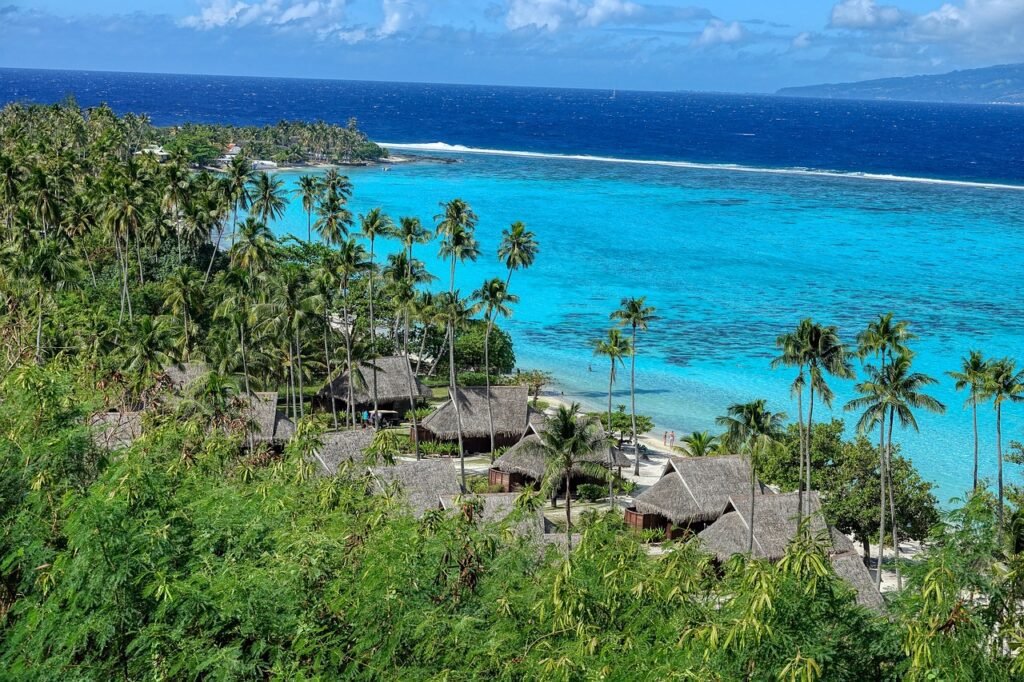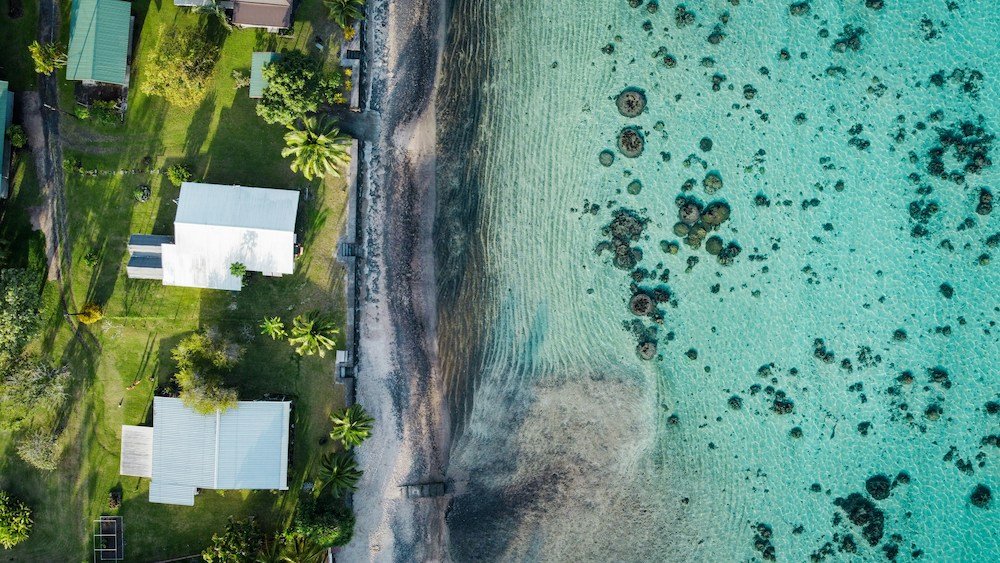
Want to discover everything you need to know about Moorea French Polynesia?
Nestled in the heart of the South Pacific, Moorea is a captivating island located in French Polynesia.
Situated just a short ferry ride away from Tahiti, Moorea boasts breathtaking landscapes, pristine beaches, and lush mountains.
Its coordinates (17.5707° S, 149.8636° W) place it among the Society Islands archipelago, making it an integral part of the French Polynesian territory.
Why Moorea is a Must-Visit Destination for Travelers
Moorea’s allure lies in its unspoiled beauty and diverse array of attractions that cater to every traveler’s desires.
Here are several compelling reasons why Moorea should be on every traveler’s bucket list:
1. Natural Splendor:
Moorea’s dramatic landscapes, characterized by emerald-green peaks, turquoise lagoons, and sugar-white beaches, create a picturesque paradise unlike any other.
The island’s stunning scenery provides endless opportunities for outdoor adventures and awe-inspiring photography.
2. Rich Marine Life:
Beneath Moorea’s crystal-clear waters lies a vibrant underwater world teeming with marine life.
Snorkelers and divers are treated to kaleidoscopic coral reefs, graceful manta rays, and an abundance of tropical fish species, offering unforgettable encounters with nature’s wonders.
3. Adventure Playground:
From exhilarating hikes to panoramic viewpoints, to thrilling water sports such as kayaking and jet-skiing, Moorea offers an array of adrenaline-pumping activities for adventure enthusiasts.
Whether exploring hidden waterfalls or embarking on a guided ATV tour through lush jungles, the island promises excitement at every turn.
4. Cultural Immersion:
Immerse yourself in the rich cultural heritage of Moorea and gain insights into the traditions and customs of its Polynesian inhabitants.
Visitors can participate in traditional dance performances, learn about local crafts, and savor authentic Polynesian cuisine, all while experiencing the warmth and hospitality of the island’s residents.
5. Romantic Escapes:
With its secluded bungalows perched over pristine lagoons and intimate sunset cruises along the coastline, Moorea sets the stage for romantic getaways and unforgettable honeymoons.
Couples can indulge in luxurious spa treatments, private beach picnics, and sunset dinners overlooking the Pacific Ocean, creating memories to last a lifetime.
Moorea’s magnetic charm captivates travelers from around the globe, offering a perfect blend of natural beauty, adventure, and relaxation.
Whether seeking an adrenaline-fueled escapade or a tranquil retreat in paradise, Moorea promises an unforgettable journey that surpasses all expectations.
Getting to Moorea

Transportation Options
Travelers have several transportation options to reach the captivating island of Moorea:
- Flights: The most common way to reach Moorea is by flying into Faa’a International Airport (PPT) in Tahiti, followed by a short connecting flight to Moorea’s domestic airport, Moorea Airport (MOZ). Air Tahiti operates regular flights between Tahiti and Moorea, providing convenient access to the island.
- Ferries: Another popular option is to take a ferry from Papeete, Tahiti’s capital, to Moorea. The ferry ride offers stunning views of the surrounding islands and typically takes around 30-45 minutes, depending on the ferry service provider.
Tips for Booking Flights or Ferry Tickets
To ensure a smooth travel experience to Moorea, consider the following tips when booking flights or ferry tickets:
- Book in Advance: Especially during peak tourist seasons, it’s advisable to book flights or ferry tickets well in advance to secure your preferred travel dates and avoid last-minute hassles.
- Compare Prices: Compare prices from different airlines or ferry operators to find the most cost-effective and convenient travel options. Online travel agencies and booking platforms often offer competitive deals and discounts.
- Flexible Travel Dates: If your travel plans allow flexibility, consider adjusting your travel dates to take advantage of lower fares or discounted ticket prices.
- Check Baggage Allowances: Be mindful of baggage allowances and any additional fees associated with checked baggage or oversized luggage, especially when traveling by air.
- Arrive Early: Whether flying or taking a ferry, plan to arrive at the departure point well in advance to allow sufficient time for check-in procedures and security screenings.
Considerations for Traveling Within Moorea
Once you’ve arrived in Moorea, getting around the island is relatively straightforward.
Consider the following transportation options for exploring Moorea:
- Rental Cars: Renting a car is a popular choice for travelers who prefer flexibility and independence in exploring Moorea’s attractions. Several car rental agencies operate on the island, offering a variety of vehicles to suit different preferences and budgets.
- Taxis and Transfers: Taxis are available at the airport and ferry terminals, providing convenient transportation to hotels and resorts across the island. Additionally, many hotels offer shuttle services or arrange airport transfers for their guests.
- Bicycles and Scooters: For eco-conscious travelers seeking a more adventurous way to explore Moorea, renting bicycles or scooters offers a fun and eco-friendly option to navigate the island’s scenic roads and coastal paths.
- Public Transportation: Moorea also has a limited public bus service that operates along the main coastal road, providing an affordable means of transportation for travelers looking to explore the island’s various attractions.
Accommodation Options

Moorea offers a diverse range of accommodations to suit every traveler’s preferences and budgetary considerations:
- Luxury Resorts: Indulge in the ultimate luxury experience by staying at one of Moorea’s exquisite overwater bungalows or beachfront villas. These upscale resorts offer world-class amenities, private plunge pools, and breathtaking views of the lagoon, providing an unforgettable retreat in paradise.
- Boutique Hotels: Boutique hotels and boutique resorts in Moorea combine personalized service with intimate atmospheres, catering to discerning travelers seeking unique and authentic experiences. These charming accommodations often feature stylish décor, lush gardens, and serene beachfront settings, ensuring a memorable stay on the island.
- Guesthouses and Bed & Breakfasts: For a more intimate and authentic Polynesian experience, consider staying at a guesthouse or bed & breakfast in Moorea. Run by local hosts, these family-owned establishments offer warm hospitality, cultural insights, and personalized attention, providing guests with a home away from home.
- Vacation Rentals: Vacation rentals, including private homes, villas, and apartments, are popular choices for travelers seeking flexibility, space, and privacy during their stay in Moorea. Platforms like Airbnb and VRBO feature a variety of accommodation options across the island, ranging from cozy beachfront cottages to spacious luxury estates.
Recommendations for Different Budgets and Preferences
When choosing accommodation in Moorea, consider the following recommendations based on different budgets and preferences:
- Luxury Travelers: For an opulent escape, indulge in the luxurious amenities and impeccable service offered by Moorea’s renowned five-star resorts, such as Hilton Moorea Lagoon Resort & Spa and InterContinental Moorea Resort & Spa.
- Mid-Range Travelers: Opt for boutique hotels or guesthouses that provide a perfect balance of comfort, affordability, and authenticity, such as Fare Vaihere or Hotel Kaveka.
- Budget Travelers: Travelers on a budget can explore affordable accommodation options, including budget-friendly guesthouses, backpacker hostels, and vacation rentals, such as Moorea Surf Bed & Breakfast or Fare Edith.
Unique Accommodation Experiences
Experience the magic of Moorea by choosing accommodation that offers unique and unforgettable experiences:
- Overwater Bungalows: Treat yourself to the ultimate luxury experience by staying in an overwater bungalow, where you can wake up to panoramic views of the turquoise lagoon and vibrant marine life just steps away from your private deck.
- Eco-Lodges and Retreats: Immerse yourself in nature and sustainability by staying at eco-lodges and retreats nestled amidst lush tropical gardens and pristine landscapes. These eco-friendly accommodations offer a tranquil escape while minimizing environmental impact.
- Cultural Homestays: Embark on a cultural journey by staying with local families and participating in traditional Polynesian activities, such as cooking classes, handicraft workshops, and storytelling sessions, providing authentic insights into Moorea’s rich heritage and customs.
Attractions and Activities

Moorea offers a wealth of attractions and activities that cater to every traveler’s interests, ranging from exploring its natural beauty to engaging in thrilling adventures and cultural experiences:
Exploring Moorea’s Natural Beauty
- Beaches: Moorea boasts some of the most picturesque beaches in French Polynesia, including Temae Beach, Ta’ahiamanu Beach, and Opunohu Bay. Spend leisurely days sunbathing on pristine sands, swimming in crystal-clear waters, and admiring stunning sunsets over the Pacific Ocean.
- Mountains: The island’s rugged interior is adorned with majestic mountains, including Mount Rotui and Mount Tohivea. Embark on hiking trails that lead to panoramic viewpoints, offering breathtaking vistas of the lush valleys, turquoise lagoons, and verdant peaks that define Moorea’s dramatic landscape.
- Waterfalls: Explore Moorea’s lush hinterland and discover hidden waterfalls nestled amidst tropical forests. Top attractions include Afareaitu Waterfalls and the majestic cascades of the Belvedere Lookout, where you can cool off with refreshing swims and immerse yourself in the island’s natural wonders.
Water Activities
- Snorkeling: Dive into Moorea’s vibrant underwater world and snorkel among colorful coral gardens, tropical fish, and graceful marine creatures. Popular snorkeling spots include the lagoon at Cook’s Bay, where you can encounter stingrays and reef sharks in their natural habitat.
- Diving: Explore the diverse marine ecosystems surrounding Moorea through exhilarating scuba diving adventures. Dive sites such as Tiki Point and Shark’s Cove offer encounters with a variety of marine life, including reef sharks, sea turtles, and eagle rays, against the backdrop of stunning coral reefs and underwater formations.
- Paddleboarding: Glide across the calm waters of Moorea’s lagoon on a stand-up paddleboard and soak in the breathtaking coastal scenery. Whether exploring secluded coves, mangrove forests, or vibrant coral gardens, paddleboarding offers a serene and immersive way to experience the island’s pristine marine environment.
Land-Based Activities
- Hiking: Lace up your hiking boots and explore Moorea’s network of scenic trails that wind through lush valleys, dense forests, and volcanic peaks. Hike to the summit of Mount Rotui or embark on the Three Coconuts Trail for panoramic views of the island’s stunning landscapes and surrounding atolls.
- ATV Tours: Discover Moorea’s rugged terrain and hidden gems on an exhilarating ATV tour that traverses dirt tracks, river crossings, and scenic viewpoints. Ride through pineapple plantations, vanilla farms, and ancient Polynesian archaeological sites, immersing yourself in the island’s rich cultural and natural heritage.
- Cultural Experiences: Immerse yourself in Moorea’s vibrant Polynesian culture through authentic cultural experiences, such as traditional dance performances, handicraft demonstrations, and cultural workshops. Visit marae (ancient stone temples), learn to play the ukulele, or participate in a Tahitian cooking class, gaining insights into the island’s rich heritage and traditions.
Wildlife Encounters and Eco-Tourism Opportunities
- Dolphin and Whale Watching: Embark on a guided boat tour and witness the majesty of Moorea’s resident dolphins and whales as they frolic in the island’s pristine waters. From spinner dolphins to humpback whales, Moorea offers unparalleled opportunities for close encounters with these magnificent marine mammals.
- Eco-Tourism Adventures: Support sustainable tourism initiatives and eco-friendly tours that promote conservation and environmental awareness in Moorea. Join guided nature walks, birdwatching excursions, or reef conservation projects, contributing to the preservation of Moorea’s unique ecosystems and biodiversity.
Dining and Cuisine
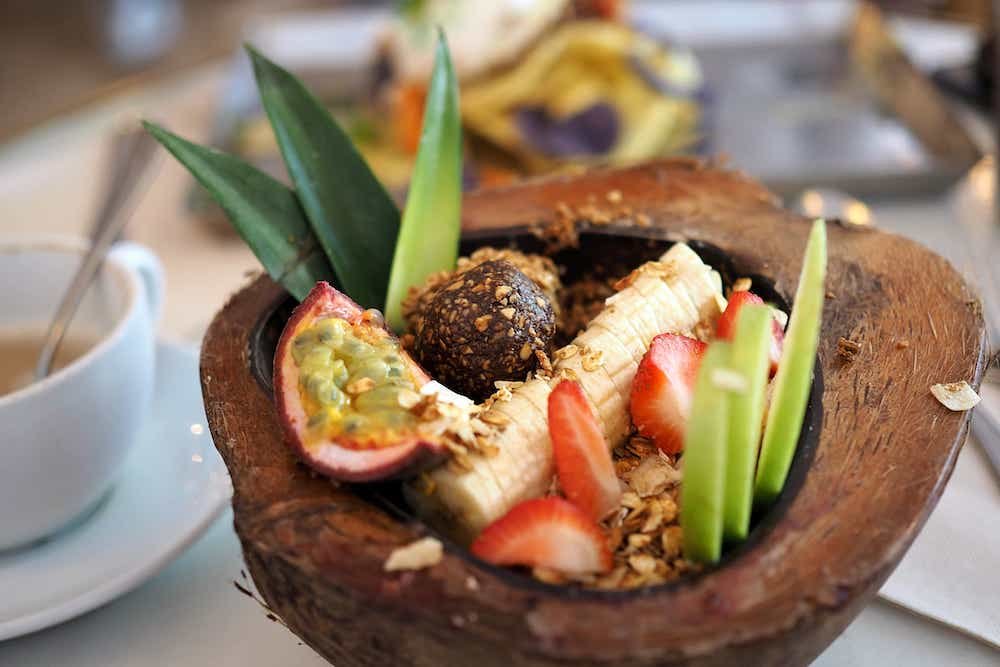
Moorea’s culinary scene is a delightful fusion of traditional Polynesian flavors, French influences, and international cuisine, offering a diverse array of dining options to satisfy every palate:
Overview of Moorea’s Culinary Scene
- Local Markets: Explore Moorea’s vibrant local markets, such as the Moorea Market in Pao Pao, where you can sample fresh tropical fruits, exotic spices, and artisanal crafts, while immersing yourself in the sights, sounds, and aromas of Polynesian culture.
- French-Inspired Cuisine: Indulge in exquisite French-inspired cuisine at upscale restaurants and bistros across the island, where you can savor gourmet dishes prepared with locally sourced ingredients and paired with fine wines from the region.
- Street Food and Food Trucks: Experience the flavors of Moorea’s street food scene by sampling savory crepes, fresh seafood, and tropical fruit juices from colorful food trucks and roadside stalls scattered throughout the island, offering authentic and affordable culinary delights.
Must-Try Dishes and Local Delicacies
- Poisson Cru: A quintessential Tahitian dish, poisson cru is a refreshing salad made with raw fish marinated in coconut milk, lime juice, and fresh vegetables, such as tomatoes, cucumbers, and carrots, creating a harmonious blend of flavors and textures.
- Firi Firi: Savor the sweet and savory flavors of firi firi, traditional Tahitian donuts made with coconut milk and served as a delightful snack or dessert, often enjoyed with a cup of aromatic Tahitian vanilla-infused coffee.
Recommendations for Restaurants and Dining Experiences
- Te Honu Iti: Nestled along the waterfront in Maharepa, Te Honu Iti offers panoramic views of Moorea’s lagoon and a diverse menu featuring fresh seafood, grilled meats, and tantalizing cocktails, creating an unforgettable dining experience.
- La Villa Mahana: Experience culinary excellence at La Villa Mahana, a Michelin-starred restaurant located in Haapiti, renowned for its innovative French-Polynesian fusion cuisine, intimate ambiance, and impeccable service, making it a must-visit destination for food enthusiasts.
- Snack Mahana: Embrace the laid-back atmosphere of Snack Mahana, a charming beachfront eatery in Cook’s Bay, known for its authentic Tahitian dishes, including poisson cru, grilled fish, and tropical fruit smoothies, offering a true taste of Moorea’s culinary heritage.
Cultural Insights
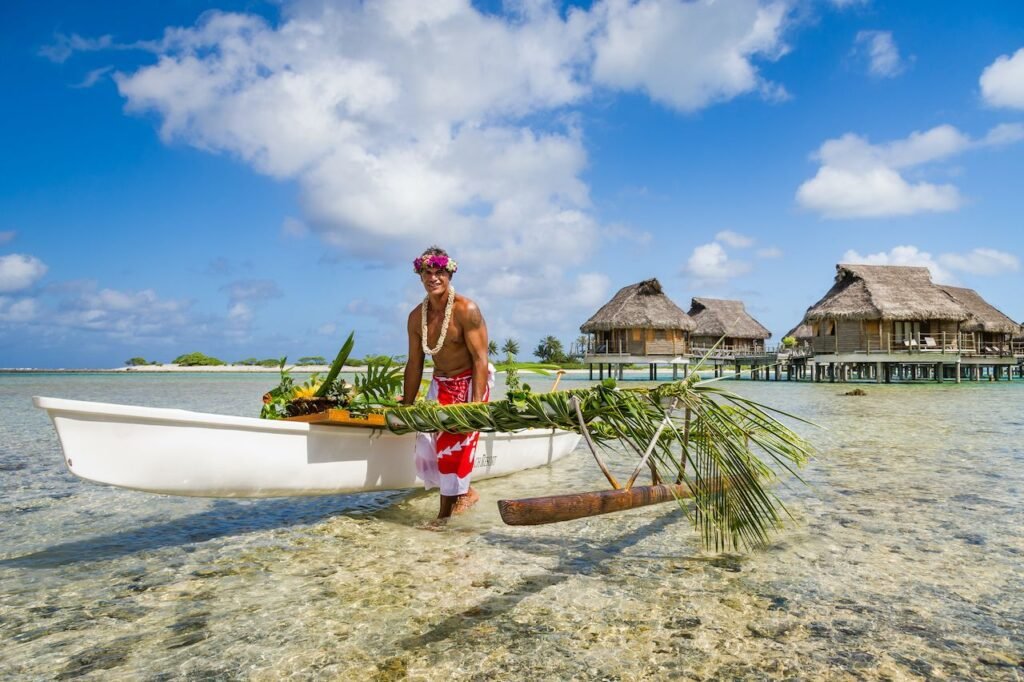
Moorea’s rich cultural heritage and vibrant Polynesian traditions offer travelers a fascinating glimpse into the island’s history, customs, and way of life:
Brief History and Cultural Background of Moorea
- Polynesian Settlement: Moorea has been inhabited for over a millennium, with evidence of Polynesian settlement dating back to the 9th century. The island’s lush valleys and fertile coastal plains attracted early Polynesian navigators, who established thriving communities based on fishing, agriculture, and maritime trade.
- European Exploration: In the late 18th century, European explorers, including Captain James Cook and Louis Antoine de Bougainville, visited Moorea, documenting its natural beauty and indigenous culture. French missionaries and colonial administrators later arrived, influencing the island’s socio-cultural landscape and introducing Christianity and European customs.
- Cultural Revival: In recent decades, Moorea has experienced a cultural revival, with efforts to preserve and celebrate its indigenous heritage through traditional arts, music, dance, and language revitalization initiatives. Local communities actively participate in cultural festivals, ceremonies, and storytelling sessions, fostering a sense of pride and identity among the island’s inhabitants.
Indigenous Polynesian Culture and Traditions
- Tahitian Language and Hula: The Tahitian language, closely related to Hawaiian and other Polynesian languages, serves as a cornerstone of Moorea’s cultural identity, with traditional chants, songs, and hula dances preserving ancestral knowledge and oral histories passed down through generations.
- Tapu and Mana: Central to Polynesian belief systems are concepts of tapu (sacredness) and mana (spiritual power), which govern social interactions, religious ceremonies, and traditional practices. Respect for ancestral spirits, sacred sites, and natural resources underscores Moorea’s deep spiritual connection to the land and sea.
- Arts and Handicrafts: Moorea’s artisans showcase their talents through intricate wood carvings, woven baskets, and fine tapa cloth, reflecting the island’s artistic traditions and craftsmanship. Visitors can explore local markets and artisan workshops to admire and purchase authentic Polynesian artworks and souvenirs.
Opportunities for Cultural Immersion and Learning
- Cultural Workshops: Participate in cultural workshops and hands-on experiences that offer insights into Moorea’s traditional crafts, such as pareo (sarong) tying, lei making, and coconut husking demonstrations, providing immersive opportunities to learn from local artisans and cultural practitioners.
- Marae Visits: Explore ancient marae (stone temple complexes) scattered across Moorea’s landscape, where you can learn about Polynesian religious practices, rituals, and ancestral genealogies, gaining a deeper understanding of Moorea’s spiritual and cultural heritage.
- Traditional Festivals: Attend traditional festivals and cultural events, such as Heiva i Moorea, an annual celebration of Polynesian dance, music, and sports, where communities come together to showcase their talents, honor their ancestors, and celebrate their cultural identity.
Practical Tips for Travelers

Preparing for your journey to Moorea involves careful planning and consideration of various practical aspects to ensure a smooth and enjoyable travel experience:
Best Time to Visit Moorea
- Dry Season: The best time to visit Moorea is during the dry season, which typically extends from May to October. During this period, the weather is sunny and dry, with lower humidity levels and less chance of rainfall, ideal for outdoor activities and beach relaxation.
- Whale Watching Season: Travelers interested in whale watching should plan their visit between July and November, when humpback whales migrate to the warm waters of French Polynesia to breed and nurse their young, offering unparalleled opportunities for close encounters with these majestic marine mammals.
Packing Essentials and Travel Tips
- Light Clothing: Pack lightweight, breathable clothing suitable for tropical climates, including swimsuits, shorts, T-shirts, and sandals, along with a wide-brimmed hat, sunglasses, and sunscreen for protection against the sun’s rays.
- Mosquito Repellent: Bring mosquito repellent and insect bite cream to guard against mosquitoes and other insects, particularly during dawn and dusk when they are most active.
- Waterproof Gear: If you plan to engage in water sports or outdoor activities, invest in waterproof gear, such as dry bags, waterproof phone cases, and reef-safe sunscreen, to protect your belongings and the marine environment.
- Travel Adapters: Moorea uses European-style power outlets with a voltage of 220-240V, so be sure to pack travel adapters and voltage converters if necessary to charge your electronic devices.
Safety Precautions and Health Considerations
- Swim Safely: Exercise caution when swimming and snorkeling in Moorea’s lagoons, as strong currents and underwater hazards can pose risks, particularly in remote areas and during inclement weather conditions.
- Stay Hydrated: Drink plenty of water and stay hydrated, especially when engaging in outdoor activities or spending extended periods in the sun to prevent dehydration and heat-related illnesses.
- Medical Care: Ensure you have adequate travel insurance coverage that includes emergency medical evacuation and repatriation services, and familiarize yourself with the location of medical facilities and pharmacies on the island in case of medical emergencies.
Currency, Language, and Communication
- Currency: The official currency of French Polynesia is the French Pacific Franc (XPF), commonly referred to as the CFP franc. Major credit cards are widely accepted at hotels, restaurants, and tourist establishments, but it’s advisable to carry some cash for smaller purchases and transactions.
- Language: French and Tahitian are the official languages of French Polynesia, although English is also spoken and understood in tourist areas and by hospitality staff. Learning a few basic French phrases can enhance your interactions with locals and enrich your travel experience.
- Communication: Mobile phone coverage is generally reliable in Moorea, with local telecom providers offering prepaid SIM cards and mobile data plans for visitors. International roaming services may also be available through your home mobile network provider, but it’s advisable to check roaming rates and coverage areas in advance.
Sustainable Tourism Practices
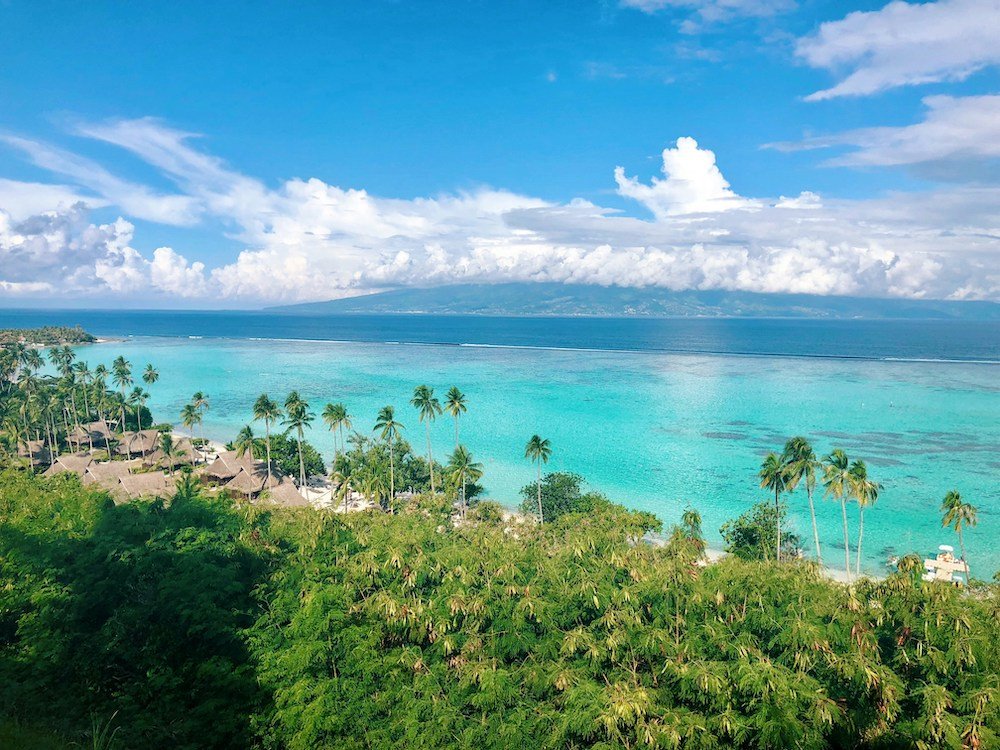
Embracing sustainable tourism practices in Moorea is essential for preserving its natural beauty, cultural heritage, and biodiversity for future generations.
Here’s how travelers can contribute to responsible travel and environmental conservation efforts:
Importance of Responsible Travel in Moorea
- Preservation of Ecosystems: Moorea’s delicate ecosystems, including coral reefs, rainforests, and marine habitats, are vulnerable to environmental degradation and climate change. Responsible travel practices help minimize the negative impacts of tourism on these fragile environments, ensuring their long-term preservation and sustainability.
- Cultural Respect and Preservation: Respecting local customs, traditions, and cultural heritage is integral to sustainable tourism in Moorea. By engaging with indigenous communities, supporting cultural initiatives, and learning about Polynesian history and traditions, travelers can contribute to the preservation and revitalization of Moorea’s unique cultural identity.
Tips for Minimizing Environmental Impact
- Reduce, Reuse, Recycle: Practice waste reduction and recycling by minimizing single-use plastics, recycling materials whenever possible, and disposing of waste responsibly. Opt for reusable water bottles, shopping bags, and eco-friendly products to minimize plastic pollution and environmental footprint.
- Conserve Water and Energy: Practice water and energy conservation by taking shorter showers, turning off lights and electronic devices when not in use, and using energy-efficient appliances and lighting fixtures to reduce carbon emissions and resource consumption.
- Responsible Wildlife Viewing: Respect wildlife habitats and observe animals from a safe distance to avoid disturbing their natural behaviors. Refrain from feeding or touching wildlife, and adhere to designated guidelines and regulations for wildlife encounters and protected areas.
Supporting Local Communities and Businesses
- Choose Sustainable Accommodations: Support eco-friendly hotels, lodges, and guesthouses that prioritize environmental conservation, community engagement, and sustainable tourism practices. Look for certifications such as Green Globe or EarthCheck to identify accommodation options committed to responsible travel.
- Purchase Locally-Made Products: Support local artisans, craftsmen, and farmers by purchasing handmade souvenirs, handicrafts, and locally-produced goods, contributing to the economic livelihoods of indigenous communities and promoting cultural authenticity and diversity.
- Participate in Community-Based Tourism Initiatives: Engage in community-based tourism activities, such as guided cultural tours, homestays, and volunteer projects, that empower local communities, foster cultural exchange, and generate income for grassroots initiatives and sustainable development projects.
Conclusion
Moorea, with its breathtaking landscapes, vibrant culture, and warm hospitality, invites travelers to embark on a journey of discovery and enchantment in the heart of French Polynesia.
As you conclude your exploration of this captivating island paradise, here are some final reflections and reminders:
From the rugged peaks of Mount Rotui to the turquoise waters of Temae Beach, Moorea offers a diverse array of attractions and experiences for every traveler.
Whether snorkeling among vibrant coral reefs, hiking to panoramic viewpoints, or immersing yourself in Polynesian culture, Moorea’s natural beauty and cultural richness leave a lasting impression on all who visit.
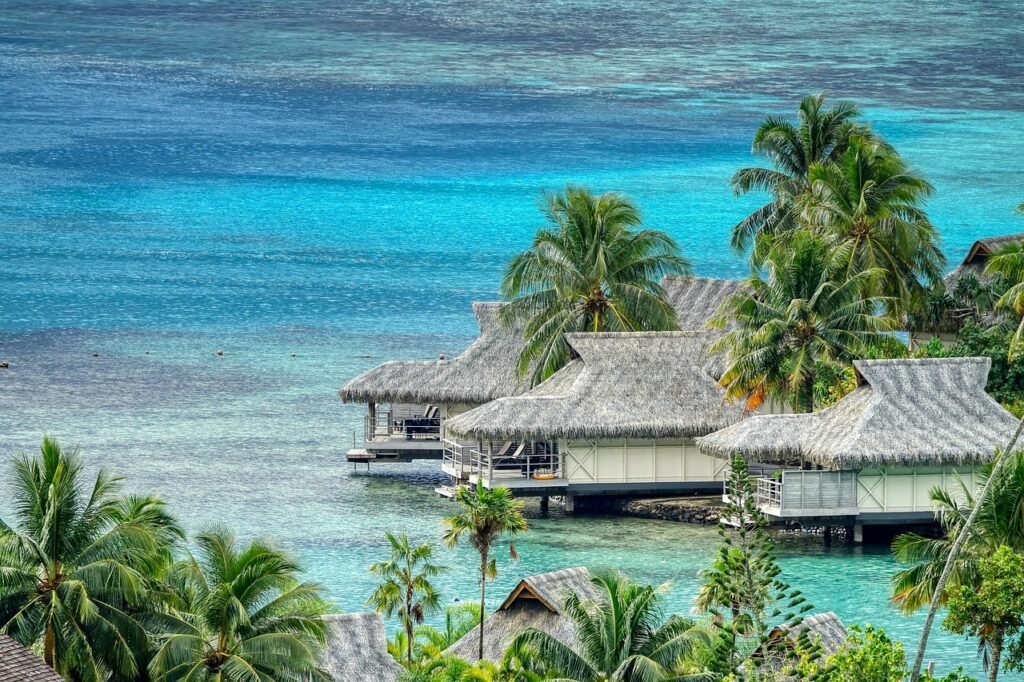
FAQ’s About Moorea French Polynesia:
What is special about Moorea?
Moorea’s allure lies in its stunning natural beauty, characterized by lush mountains, pristine beaches, and vibrant coral reefs.
The island offers a perfect blend of adventure and relaxation, with opportunities for snorkeling, hiking, and cultural immersion amidst a backdrop of breathtaking scenery.
Is it worth going to Moorea?
Absolutely. Moorea offers a unique and unforgettable experience for travelers seeking tropical paradise.
Whether you’re drawn to its picturesque landscapes, diverse marine life, or rich cultural heritage, Moorea promises a memorable journey filled with adventure, relaxation, and discovery.
Is Moorea as beautiful as Bora Bora?
Moorea and Bora Bora each have their own unique charm and beauty.
While Bora Bora is renowned for its iconic overwater bungalows and crystalline lagoons, Moorea captivates visitors with its dramatic mountains, lush valleys, and vibrant coral reefs.
Both islands offer spectacular natural scenery and unforgettable experiences.
Is it better to stay on Tahiti or Moorea?
The choice between Tahiti and Moorea depends on your preferences and travel itinerary.
Tahiti offers a bustling urban atmosphere with cultural attractions and vibrant markets, while Moorea provides a more laid-back and scenic escape amidst pristine nature and tranquil beaches.
Many visitors choose to combine both destinations for a well-rounded Tahitian experience.
Can you walk around Moorea?
Yes, Moorea is relatively easy to explore on foot, especially in areas with pedestrian-friendly paths and sidewalks.
Many hotels and resorts also offer bicycles or scooters for rent, providing convenient transportation options for exploring the island at your own pace.
What is the best month to visit Moorea?
The best time to visit Moorea is during the dry season, which typically extends from May to October.
During this period, the weather is sunny and dry, with pleasant temperatures and lower humidity levels, making it ideal for outdoor activities, beach relaxation, and exploring the island’s attractions.
Can you swim in Moorea?
Absolutely. Moorea boasts pristine lagoons and sheltered bays with crystal-clear waters, perfect for swimming, snorkeling, and water sports.
Visitors can immerse themselves in the warm turquoise waters and encounter colorful marine life, including tropical fish, rays, and sometimes even dolphins.
How many days should I stay in Moorea?
The ideal length of stay in Moorea depends on your travel preferences and interests.
Many travelers find that spending 3 to 5 days allows enough time to explore the island’s highlights, engage in outdoor activities, and relax on its beautiful beaches while soaking in the tranquil ambiance of French Polynesia.
Do people speak English in Moorea?
While French and Tahitian are the official languages of French Polynesia, including Moorea, many locals in tourist areas and hospitality establishments speak English, especially in hotels, restaurants, and tourist attractions.
Basic English is generally understood, making communication relatively easy for English-speaking visitors.
